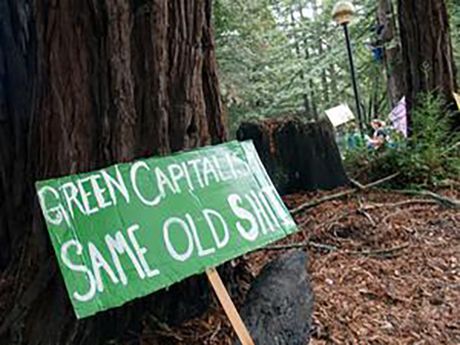Features
You are here
BC Greens: open for business

May 3, 2017
The BC Greens present themselves as neither right nor left, and as always happens when people take this position they end up on the right.
Greenwashing
Let's start with their climate platform. You would expect that a Green party would have a serious approach to dealing with climate change and trying to cut green house gas emissions. The Green platform is mostly wishful thinking. Oddly it starts by complimenting the Liberal government of Gordon Campbell, claiming that “In 2008, B.C. became a global leader in climate action.” This is a reference to the half-hearted attempts by the BC Liberal government to deal with climate change by implementing a carbon tax, and forcing public sector institutions to buy into carbon offset scams. Their pro-business priorities continue through the platform document: “Acting on climate is about positioning B.C. to succeed in the emerging economy of the future “
Acknowledging the failure of the BC Liberals to meet their own targets, the Greens propose an interim target that allows 20 per cent more GHG emissions then the Liberal plan by 2020 and then it catches up to the Liberal target by 2050. Their plan to get there includes increasing the regressive carbon flat tax Fortunately, they plan to abandon the requirement that public sector agencies be required to buy carbon offsets, and instead will require them to become truly carbon neutral.
Their platform includes four “pathways” to reducing greenhouse gas emissions. The first pathway is lifestyle changes. They propose public information campaigns to get people to choose less carbon intensive alternatives. This includes incentives for purchasing electric vehicles, in other words subsidies to car manufactures, and continuing to rely on personal vehicles. They also suggest distance-based car insurance and road pricing. Both of which have little effect on the wealthy and will penalize workers who can not afford to live in the astronomically over priced centre of the Vancouver region and must commute in from the suburbs. The platform does include promises to increase funding for transit, but there are no dollars attached
They have a requirement to phase out diesel and gasoline urban delivery vehicles, but it has a very long time frame; the end to new registrations won't come until 2025.
They also plan to make better use of forests as carbon sinks, as they admit, “due to the mountain pine beetle infestation, fires and over-harvesting, BC’s forests are currently net emitters of carbon.” It is not clear how, or if that can be changed.
Austerity
Their platform on income security has the same pro-business bias that the climate platform has. A major plank is moving toward a basic income. As has been well documented this is a strategy to subsidize businesses who won't pay proper wages and to slash funding to public services.
Their first steps on this road are good: they propose increasing the rates for persons with disabilities, the income assistance rates, and the shelter rates. However they are careful to reassure business that “financial disincentives to work are avoided.” This is only possible if income assistance rates remain lower then the less than poverty level minimum wage. The Greens do not commit to a $15 an hour minimum wage. Instead they will convene a “fair wages commission,” that will include, “business leaders, small business representatives, unions and the nonprofit sector” Which of course means that the profits of minimum wage employers like Walmart and McDonalds will be considered with equal weight to the needs of minimum wage workers in BC who live below the poverty line. There is also nothing in the platform about making it easier to organize a union, or making it easier for unions to increase wages and working standards through collective bargaining. Such changes only benefit workers and only harm employers.
The rest of the platform continues the same pattern, small progressive changes in a sea of pandering to business owners. The plan for post-secondary education speculates about cutting the length of time to complete an undergraduate degree by a year or two, which would force students to even more narrow specialization then is already required. They have no plans to undo the massive funding cuts to post-secondary education implemented by the Liberals (and to a lesser degree by the NDP in the 1990's.) Instead they will convene a task force to figure out if there is a way to reduce costs for post-secondary education.
The Greens do not see that the market is the cause of climate change, homelessness, unaffordable housing, shy-rocketing tuition fees and student debt, precarious work, poverty wages and so on. Instead they look to the market for solutions for these problems. This is a failed strategy. In the extremely unlikely event that BC Greens form government, or are in a position to join a minority Liberal government, the 1%, their profits, and their corporations will be looked after. The rest of us? Not so much.
Section:










